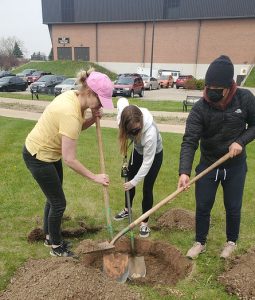Professor discusses climate change denial
May 5, 2021
There is an “incredible solid body of science” that climate change is real and happening. So why then do people still deny that it exists?

Misty McPhee, an associate professor of environmental studies and biology, spoke on that topic on April 29 for Earth Month. She said there is a difference between science rejection and science denial.
The definition of science rejection is the dismissal of well-established scientific results for reasons that are not scientifically grounded, she said. Science denialism, on the other hand, is the employment of rhetorical arguments to give the appearance of legitimate debate where there is none. This approach has the ultimate goal of rejecting a proposition on which a scientific consensus exists, she said.
McPhee said there are five characteristics of denial: cognitive bias, use of fake experts, identification of conspiracies, misusing the scientific process and misrepresentation of facts.
Cognitive bias is the tendency people have to embrace information that supports their beliefs and reject information that contradicts them.
“This idea that cognitive bias really drives how we interpret information, connects pretty profoundly to climate change,” McPhee said. “We are going to believe the information we want to believe.”
People tend to build a worldview based on what they believe, and science can be seen as a threat to a way of life. These both interact to create a cognitive shortcut, which is the way people process information and how we believe things that are not true.
An example of a cognitive shortcut would be one’s response to “What do cows drink?” A very natural answer would be milk, even though they drink water. The response one gives to this question is based on association rather than deep reflection.
When looking at data, one will either give a quick inaccurate reading or a complex accurate understanding of data. If participants agree with the topic at hand they choose a complex accurate approach, versus if the study challenges one’s worldview, they give a quick inaccurate interpretation and ignore the complex accurate information.
Someone is more likely to be perceived as an expert if they agree with you, McPhee said. Once again, we agree with things that agree with our world point view. Thanks to the internet, the world is full of self-proclaimed experts.
These experts might start conspiracy theories, which is the attempt to explain a significant political or social event as a secret plot by powerful individuals or organizations.
“They feed each other’s feelings of persecution,” McPhee said. “There’s this corrupt elite who are in charge and are persecuting all these people.”
Our dependence on other people’s perspectives is a positive feedback loop. Opinions can be baseless and pass between people.
For example, by telling one person climate change is not real, and if they tell their friend the same thing, then the loop of the baseless information goes around and around.
As more scientists get involved in a study, more questions are asked and eventually the truth can be honed in on. A consensus of truth is represented by the majority of studies.
News broadcasts often pin “experts” against each other to debate common topics at hand, such as climate change in this case.
Who denies climate change
A big assumption is that denial is purely partisan. It is not, McPhee said. Political groups are equally adept in denying what they do not want to hear.
Conspiracy theories are associated with political extremes regardless of what side one is on.
They tend to challenge Republican cultural norms more than Democrat cultural norms. The media highlights Republicans as the most common deniers of climate change.
People also tend to assume that education plays a big role in deniers of climate change. But if someone is more educated, this does not decrease the chance that they are a denier, she said. Data shows that the more educated one is, the more tied they are to their ideas and opinions.
Denial completely depends on whose worldviews are currently being pushed around amongst people.
Why deny climate change:
Every organism’s behavior has evolved to behave in ways that pass on our genes. Humans are highly social creatures that transmit behaviors.
McPhee argues that human behavior is like a tree where anything above ground is culture, which is what we see. For example, in Wisconsin, beer and cheese are cultural traits.
Everything expressed is shaped symbolically by the root system of a tree, which is shaped by our evolutionary history. Behaviors result from biological cost benefit analysis. Behaviors have to be beneficial in order to persist.
Humans have evolved to think short-term and not long-term. This is because we need to make decisions very quickly and recognize threats, she said. We apply fight or flight to data itself, helping us develop our own ideas. Cooperation and reasoning are both big factors into our reasoning as well.
“My take home is that w
e need to communicate with passion,” McPhee said. “Remember that we all have blinders, it’s not just the people who disagree with you. Anyone is much more likely to embrace an idea that comes to them from their worldview.”













